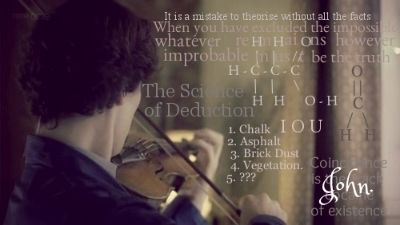
BBC Sherlock Fan Forum - Serving Sherlockians since February 2012.
- besleybean
- Threatened Knighthood
 Offline
Offline 
- From: Carnoustie, Angus, Scotland.
- Registered: October 4, 2012
- Posts: 21,380
Re: ? Say What ?
Trust you to be gruesome!
---------------------------------------------------------------------------------------------------------------------------------------------------------------
- Lily
- Official Blogger
 Offline
Offline 
- Registered: February 21, 2013
- Posts: 1,353
Re: ? Say What ?
Something that has been bothering me for over a year now: in ASIB Sherlock says to Mycroft 'Did you know there were other people after her too, Mycroft, before you sent John and I in there?'
Why is it 'John and I?' Why not 'John and me?'
--------------------------------

"Yes, of course I forgive you."
- Mnemosyne
- Mycroft's Contact
 Offline
Offline - From: UK
- Registered: November 23, 2012
- Posts: 515
Re: ? Say What ?
Lily wrote:
Something that has been bothering me for over a year now: in ASIB Sherlock says to Mycroft 'Did you know there were other people after her too, Mycroft, before you sent John and I in there?'
Why is it 'John and I?' Why not 'John and me?'
The wonderful world of English grammar... I've stopped fighting it (although sometimes my mind likes to rebel.)
It's because John/Sherlock are is a subjects in the sentence and not objects... I think, ugh my mind, it was waaaay to early to think about this.
---------------------------------------------------------------------------------------------------------------------------------------------------------

'Non Solum Ingenii Verum Etiam Virtutis'
- Lily
- Official Blogger
 Offline
Offline 
- Registered: February 21, 2013
- Posts: 1,353
Re: ? Say What ?
Mnemosyne wrote:
Lily wrote:
Something that has been bothering me for over a year now: in ASIB Sherlock says to Mycroft 'Did you know there were other people after her too, Mycroft, before you sent John and I in there?'
Why is it 'John and I?' Why not 'John and me?'The wonderful world of English grammar... I've stopped fighting it (although sometimes my mind likes to rebel.)
It's because John/Sherlock are is a subjects in the sentence and not objects... I think, ugh my mind, it was waaaay to early to think about this.
But wouldn't 'you' (Mycroft) be the subject and 'John and I/me' the object?
--------------------------------

"Yes, of course I forgive you."
- Mary Me
- High Functioning Sociopath
 Offline
Offline 
- From: Germany, Bonn
- Registered: January 8, 2013
- Posts: 3,250
Re: ? Say What ?
Someone explained it somewhere. It's just a common expression in english as far as I got it. I assume you could compare it in german with following example: "Keiner außer ich" though it would actually be "Keiner außer mir".
~~~~~~~~~~~~~~~~~~~~~~~~~~~~~~~~~~~~~~~~~~
"Falling is just like flying, except there’s a more permanent destination."
"Sherlock Holmes is a great man, and I think one day—if we’re very very lucky—he might even be a good one."
"Would you like to-"
"-have dinner?"
"-solve crimes?"
"Oh"

- Lily
- Official Blogger
 Offline
Offline 
- Registered: February 21, 2013
- Posts: 1,353
Re: ? Say What ?
Mary Me wrote:
"Keiner außer ich".
There are actually people saying that? Sounds almost as terrible as "einzigster" and "als wie". ![]()
But I assume 'John and I' must somewhow be grammatically correct, otherwise they would never have let him say it? Does that mean that 'John and me' would be wrong in that context or would both be correct?
--------------------------------

"Yes, of course I forgive you."
- Mary Me
- High Functioning Sociopath
 Offline
Offline 
- From: Germany, Bonn
- Registered: January 8, 2013
- Posts: 3,250
Re: ? Say What ?
I'm saying "Keiner außer ich"! ![]()
I think both is correct.
~~~~~~~~~~~~~~~~~~~~~~~~~~~~~~~~~~~~~~~~~~
"Falling is just like flying, except there’s a more permanent destination."
"Sherlock Holmes is a great man, and I think one day—if we’re very very lucky—he might even be a good one."
"Would you like to-"
"-have dinner?"
"-solve crimes?"
"Oh"

- AliceI
- Cipher Expert
 Offline
Offline 
- From: Upstate NY
- Registered: February 6, 2013
- Posts: 169
Re: ? Say What ?
This may seem a stupid question mainly because I do understand what it is, but what exactly does CV stand for? I am assuming that it is equivalent to what we would call a resume here in the states, but the way I have heard it used it sounds like it is something more official than a resume. Honestly when I was in management you would not believe the crap that people would put on their resumes and expect a perspective employer to believe it. I just don't see how a 19 year old could possibly have flown a fighter jet for the US Air force for a whole year! Yeah, I actually had that on a resume that came across my desk for a kid trying for a customer service position.
I give you my 2 cents on the I/me question but am unsure how the grammatical rules change from country to country. Here in the states the way to know if the word should be I or me is to take the other person out of the sentence.
"Me and Harry traveled all the way across town for a very special cup of coffee."
Take Harry out.
"Me traveled all the way across town for a very special cup of coffee." Instant cave man speak! LOL
In the case of what Sherlock said:
'Did you know there were other people after her too, Mycroft, before you sent John and I in there?'
Take John out of the sentence.
'Did you know there were other people after her too, Mycroft, before you sent I in there?'
Here in the states the dialogue should have been 'me' or the sentence re-written so that the question of I/me never comes up. Such as:
"John and I went in there not knowing that other people were after her. Did you know that, Mycroft?"
Speech patterns are different in different parts of the world. The thing with dialogue is that it really does not need to be grammatically correct because that isn't how people talk. If you are writing a paper for school or a thesis, or a work document then, yes, you should pay close attention to grammar. When dealing with written dialogue, however, you should write it the way people talk or it will end up sounding wooden and unrealistic. This is my take on why the dialogue was what we hear in the show. It would have sounded wrong for Sherlock to use the correct "me" in that bit of dialogue. It doesn't follow normal speech patterns for almost everyone. An English professor may talk like that but the average person does not. Sherlock isn't average, but if he started talking like some stuffy college professor, less viewers would identify with his character and we can't have that now can we? Modern Sherlock with modern speech patterns.
"I may be on the side of the angels,
but don't think for one second that I am one of them."
- •
- Mnemosyne
- Mycroft's Contact
 Offline
Offline - From: UK
- Registered: November 23, 2012
- Posts: 515
Re: ? Say What ?
Lily wrote:
Mnemosyne wrote:
Lily wrote:
Something that has been bothering me for over a year now: in ASIB Sherlock says to Mycroft 'Did you know there were other people after her too, Mycroft, before you sent John and I in there?'
Why is it 'John and I?' Why not 'John and me?'The wonderful world of English grammar... I've stopped fighting it (although sometimes my mind likes to rebel.)
It's because John/Sherlock are is a subjects in the sentence and not objects... I think, ugh my mind, it was waaaay to early to think about this.
But wouldn't 'you' (Mycroft) be the subject and 'John and I/me' the object?
To be fair 'John and I' sounds... well... posh. And Mycroft might die a little inside if he had to say it any other way.
@Alicel: CV stands for 'Curriculum Vitae'. It litterally means 'Course of Life' and is like a resume. And I'm certain that in quite a few vocations (if not all of them) it is illegal to lie on your CV over here and is classed as fraud. If you're caught you can be prosecuted.
---------------------------------------------------------------------------------------------------------------------------------------------------------

'Non Solum Ingenii Verum Etiam Virtutis'
- Davina
- Moderator
 Offline
Offline 
- From: The Only Way is Essex UK
- Registered: February 9, 2012
- Posts: 9,714
Re: ? Say What ?
If you lie on your CV are given the job and the lie is discovered at a later date then it is grounds for instant dismissal. It could also be prosecuted as fraud depending upon circumstances.
![]()
---------------------------------------------------------------------------------------------------------------------------------------------
Don't make people into heroes John. Heroes don't exist and if they did I wouldn't be one of them.


